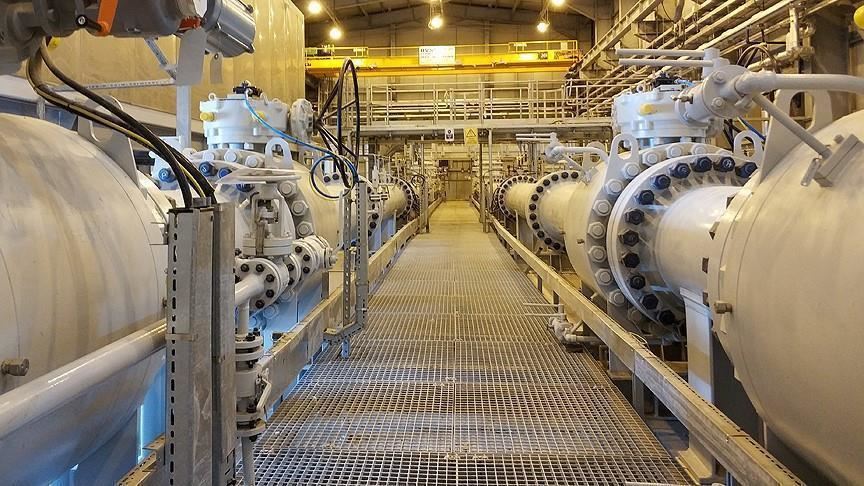No need for plan B against US sanctions: Nord Stream 2
Pipeline project continues on schedule despite US’ and some European nations’ fierce opposition

BERLIN
The Nord Stream 2 natural gas pipeline project is in full compliance with the rule of law and does not need a plan B against any potential U.S. sanctions, the project spokesman told Anadolu Agency on Monday in Berlin.
“We are at ease,” regarding the project, Jens D. Mueller, project spokesperson told Anadolu Agency on Monday in Berlin as every step taken by the Nord Stream 2 company is in compliance with regulations.
“There is a solid commitment by investors. Financing completely assured by shareholders and investors. Pipelaying is continuing as planned. So, at the moment, we don’t see any need for plan B [against possible U.S. sanctions], Mueller said.
“It is not a secret that a way of implementing 'America First' in energy is opposition to Nord Stream 2. There is a huge commercial interest to increase U.S.’ LNG deliveries to Europe. The political reflection of this commercial interest is the argumentation against Nord Stream 2,” he said.
The U.S., some Eastern European countries and Baltic republics disapprove the project on the basis that it will increase the EU’s dependence on Russian natural gas exports.
The Nord Stream project -- operational since 2011 with an annual capacity of 55 billion cubic meters -- brings Russian gas directly to Germany via the Baltic Sea. The Nord Stream 2, which plans to become operational by the end of 2019, also has the same annual capacity and runs almost parallel to the first pipeline route. Together they will meet the annual gas demand of a quarter of the European continent.
On May 4, U.S. President Donald Trump, in a joint statement with Slovakian Prime Minister Peter Pellegrini, strongly criticized the project and said it would leave some countries vulnerable.
“Our countries also affirm that energy security is fundamental to national security. We reiterate our opposition to the use of energy projects as geopolitical weapons, including Nord Stream 2,” the statement read.
Furthermore, the U.S. Ambassador to Germany, Richard Grenell, warned German companies that they could be punished if they continue to collaborate with Russia on the project.
“Regarding sanctions, whatever we do is based on the rule of law. The sanctions bill is from August 2017, and the implementation of these sanctions are specified in guidance delivered by the state department in October 2017,” he said.
“The existing guidance, first of all, underlines all sanctions have to be coordinated with allies. Secondly, the security of energy security should not be harmed. Thirdly, all agreements signed before the law that came into force should not be touched by the sanctions,” he explained.
“All contracts regarding the pipe delivery and as well as financial agreements with all investors have been made before [the bill]. So theoretically, the current regulation in the U.S. could not be implemented to the project,” he argued.
“However, you can read every week some speculation about a new sanction. As a project developer we cannot comment on political speculations,” he added.
Opposition within EU
Latvia, Lithuania and Estonia expressed their opposition to the project in early April at a meeting with Trump in the White House.
Poland, Denmark and Ukraine also oppose the project, arguing that it would increase the EU's dependency on Russian gas and urge that Europe instead focus on diversifying its energy resources.
“Regarding the discussions in Europe about the Nord Stream 2, the activities and construction are implemented in total compliance with international and national laws and EU regulations. My understanding is that you always will find a certain share of legitimate commercial interest amongst critiques of Nord Stream 2 [in EU],” he said.
“Looking at Poland, for example, the country which has 90% of its gas from non-Russian sources, its LNG facility co-founded by EU and also the new pipeline for Norwegian gas co-founded by EU with €220 million. This legitimate interest is reflected in the political debate,” he said, adding that statements from German center-right European People’s Party candidate for the President of the European Commission Manfred Weber fit the same narrative.
Weber said in late April that the project would increase the EU’s dependence on Russian Gas.
“I am against this project. It’s not in the interest of the European Union and that is why as the head of the European Commission, I will use all legal instruments available to block Nord Stream 2,” he said.
In front of Polish media, Weber said he would like to stop the project but his statements made in public in Germany are quite different, the spokesman for the project said.
“This is a political intention. The pipeline is being constructed according to the national and international law, and EU regulations. The pipeline has got permits from four governments. This is something even Mr. Weber will not be able to stop,” the spokesman said.
Denmark’s permit procedure
Denmark passed a law at the end of November 2017 to permit the Danish foreign minister to ban the pipeline from traversing its waters. Denmark has decided that it will not grant permission for a northern route of the project and has asked the Russian-owned company to look into a southern route instead.
"There is enough reason to believe that a permit by Denmark will be granted as we applied for a third time to Danish authorities and made the necessary changes according to their demands," Mueller said.
The project will become operational in accordance with the existing timeline before the end of 2019, he added.
The spokesman said that in the case of any delay to the project, it would incur a daily cost of $20 million based on global gas market developments, especially in the LNG sector.
Anadolu Agency website contains only a portion of the news stories offered to subscribers in the AA News Broadcasting System (HAS), and in summarized form. Please contact us for subscription options.


